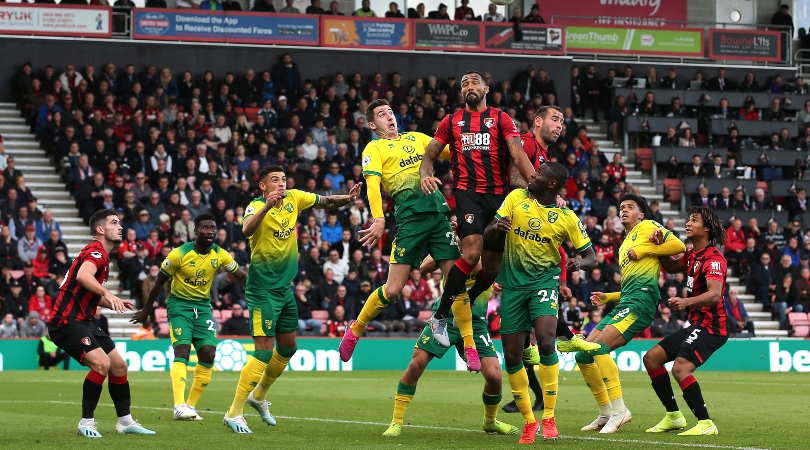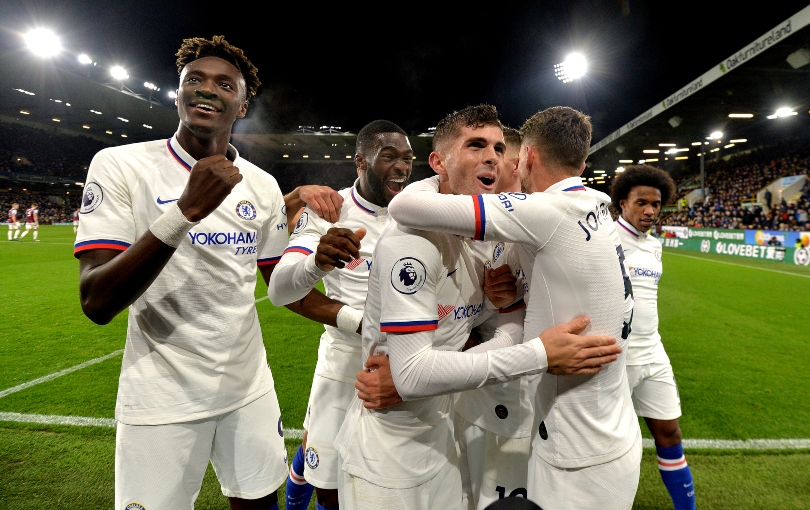How Bournemouth's set-pieces are saving them this season
Eddie Howe's side are going through a dry patch in front in goal. Their new-found reliance on free-kicks and corners may just be their saving grace

Bournemouth aren’t scoring many goals. They've managed just 13 so far this season, a tally which partially disguises a fine defensive improvement at the other end of the pitch.
It’s difficult to explain why. One answer could lie in the absence of David Brooks, Eddie Howe’s most gifted creator, but another could be the reimagination of the midfield in general, which has had to become less porous to address the side's long-term vulnerability.
Ten games in, though, one area which is functioning as it should is Bournemouth’s productivity from attacking set-pieces. Six of their 13 goals have come from free-kicks or corners, a number that only Manchester City can match in the Premier League.
Statistically, they’ve possessed a clear edge this season. Across all the games played, in both the Premier League and EFL Cup, on average 36% of the corners they’ve taken have resulted in a shot on goal (vs opponents’ 32.3%). For attacking free-kicks, that figure falls to 24.4%, but still remains above their opponents' average of 22.4%.
It describes something interesting because, in profile, Bournemouth are not a team built to have a set-piece dependency. They often play with three centre-halves, that helps, but they don’t possess a lumbering target man and neither are their primary goalscorers (Josh King and Callum Wilson) known for their aerial ability.
Which means that the detail is in the design. So, what is Eddie Howe doing?
There’s certainly a pattern. On first glance, the opening goal against West Ham and the first two scored against Everton all seem like the result of mild chaos. On closer inspection, though, they extol the virtue of having free players in the right positions at the right moments.
Get FourFourTwo Newsletter
The best features, fun and footballing quizzes, straight to your inbox every week.
The King goal against West Ham, for instance, may have depended on a fortunate ricochet, but the player’s role in the move was very clearly intended to leave him free during a second or third phase.
As it was for Callum Wilson’s header against Everton. King scuffed the finish – the routine was presumably intended to culminate with him tapping home – but it was the spread of players between the posts which the visitors couldn’t cope with and Bournemouth's willingness to plan several touches ahead which rewarded them with a goal.
That, specifically, appears to be King’s role. Even for Nathan Ake’s goal at St Mary’s, which was as simple a corner move as exists, the sharp-eyed will have noticed him lurking in the same space and, again, being completely free at the far post.
The scouting tools available now allow us to look beyond just the highlights and at the many, many routines across a season which don’t end in a shot or a goal and which would otherwise just be forgotten. In Bournemouth's case, they reveal some interesting trends.
The first and most obvious is that Howe has evidently mandated that an opposing goalkeeper should never be in a position to defuse the situation. Crosses are either to be played short or low, or far enough away from the goal-line that the ‘keeper doesn’t even attempt a catch or punch.
It’s interesting to watch. Against Watford at Vicarage Road, Bournemouth earned 10 corners, shared between Diego Rico and Ryan Fraser, and not once was Ben Foster involved in making a clearance. He was pinned to his line. Not physically, but in the sense that the option to become involved just didn’t exist.
The same had been true for Tim Krul the week before, when Norwich came to Dean Court. Krul only faced five corners that day, but he had no effect on any of them and that would absolutely have been by design.
So Bournemouth want the knockdowns and the chaos, they generally don’t deliver the ball into positions from which a goal could immediately be scored. Instead, they typically use that initial cross to fix the attention of the defence on Ake, Cook, or Mepham, away from whom the pertinent movement then takes place. The real players to watch when a corner is being taken, then, are either King - obviously - or Phillip Billing.
Billing is physically imposing, a natural asset in dead-ball situations. Yet he’s either used as an outright decoy, loitering around the goalkeeper (in a position to which the ball isn’t heading) or, more often, he’s instructed to quietly step away from the flight of the ball as it enters the box. It's something which Callum Wilson can sometimes be seen doing, too. As a phalanx of players attack the cross, there's always one Bournemouth player dropping intentionally away from it, ready to either capitalise on a loose ball or prevent a defender from making a clearance.
These are simple enough facets, but they characterise Bournemouth’s thinking. The quality of the delivery (from Rico, Fraser or Harry Wilson) is a prerequisite, of course, but it's being used to service this intriguing originality. Howe and his coaching staff have built an armoury of set-pieces which have these misdirections at their core and that’s allowing Bournemouth to survive through their attacking malaise.
While you're here, why not take advantage of our brilliant subscribers' offer? Get the game's greatest stories and best journalism direct to your door for only £9.50 every quarter. Cheers!
NOW READ...
COMMENT Juan Mata once struggled to rise above Manchester United’s mediocrity. Now he’s part of the problem
QUIZ Can you name every player to score 10+ Premier League goals for Liverpool?
GUIDE Premier League live stream best VPN: how to watch every game from anywhere in the world
Seb Stafford-Bloor is a football writer at Tifo Football and member of the Football Writers' Association. He was formerly a regularly columnist for the FourFourTwo website, covering all aspects of the game, including tactical analysis, reaction pieces, longer-term trends and critiquing the increasingly shady business of football's financial side and authorities' decision-making.

